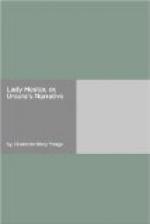The next thing that happened—I can’t tell which day it was—was Mrs. Deerhurst’s coming, professing to be dreadfully shocked and overcome by my father’s death, to take away Emily. She must be so much in our way. I, who saw her first, answered only by begging to keep her—our great comfort and the one thing that cheered and upheld my brother.
Mrs. Deerhurst looked keenly at me; and I began to wonder what she knew, but just then came Fulk into the room, with his calm, set, determined face. I knew he would rather speak without me, so I went away, and only knew what he could bear to tell me afterwards.
Mrs. Deerhurst had been a great deal kinder than he expected. No doubt she would not break the thing off while there was a shred of hope that he was an earl; but he could not drive her to allow, in so many words, that it must depend upon that.
He had quite made up his mind that it was not right to enjoy Emily’s presence and the comfort it gave him, unless he was secure of Mrs. Deerhurst’s permitting the engagement under his possible circumstances.
I believe he nattered himself she would, and let her deceive him with thinking so, instead of, as we all did, seeing that what she wanted was to secure the credit of being constant and disinterested in case he retained his position. So, although she took Emily home, she left him cheered and hopeful, admiring her, and believing that she so regarded her daughter’s happiness that, if he had enough to support her, she would overlook the loss of rank and title. He went on half the evening talking about what a remarkable woman Mrs. Deerhurst was; and, at any rate, it cheered him up through those worst days.
Our Lupton uncles came, and were frightfully shocked and incredulous; at least, Uncle George was. Uncle Lupton himself remembered something of my father having told him of a former affair in America.
They would not let Jaquetta and me go to the funeral; and they were wise, for Hester thrust herself in—but it is of no use to think about that. Indeed, there is not much to tell about that time, and I need not go into the investigation. It was all taken out of our hands, as my brother had said. Perrault came over from Canada, and brought his witnesses, but not Joel Lea. He had nothing to prove, had conscientious scruples about appearing in an English court of justice, and still hoped it would all come to nothing.
We stayed on at the London house—the lawyers said we ought, and that possession was “nine-tenths,” &c. Besides, we wanted advice for Baby, who had been worse of late.
The end of it was that it went against us. Faith’s marriage, her identity, and Hester’s, were proved beyond all doubt, and little Alured was served Earl of Trevorsham. Poor child, how ill he was just then! It was declared water on the brain! I could hardly think about anything else; but they all said it seemed like a mockery, and that he would not bear the title a week. And then Lady Hester would have been, not Countess of Trevorsham, but Viscountess Torwood, and at any rate she halved the personal property: all that had been meant for us.




